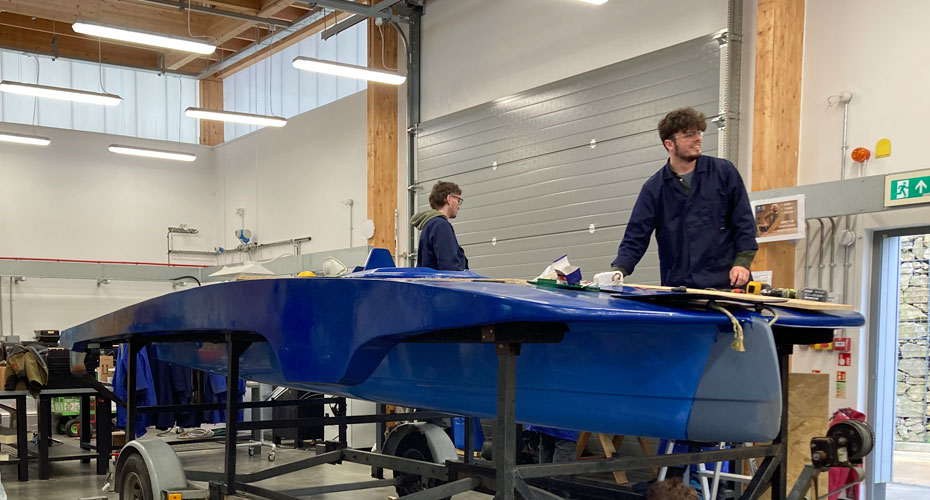| Degrees |
|
|---|---|
| Duration |
| Start date | MPhil/PhD/MSc by Research: September, January or April EngD: September |
|---|---|
| Location | Penryn Campus |
| Study modes | Full time and part time Study mode details |
Overview
- Based at the University’s Penryn Campus near Falmouth, you will work with leading research experts exploring the latest technological advances in this socially critical area of investigation
- Expertise in energy policy, marine renewables, bio-fuels, electrical power and networks, wind, photo-voltaic and thermal technologies
- Superb research facilities including a renewable energy laboratory and wind turbine
- Research funded by the UK Energy Research Centre, UK Research Councils, UK Government Departments, the European Union and private institutions
- Leading role in the £15 million PRIMaRE research institute to support the development of marine energy in the South West
Contact
Web: Enquire online
Phone: 0300 555 6060 (UK)
+44 (0)1392 723044 (non-UK)
![]()
Top 5 in the UK for Electronic Engineering
5th for Electrical & Electronic Engineering in The Complete University Guide 2025
![]()
£6.5million investment in our teaching labs, workshop spaces and equipment
![]()
Expertise in energy policy, marine renewables, biofuels, electrical power and networks, wind, photo-voltaic and thermal technologies
![]()
Specialist facilities include microscopy suite, aerodynamics and fluids laboratories, additive manufacturing workshop and vibration testing rigs
Research overview
Based at the University’s Penryn Campus near Falmouth, we are a unique multidisciplinary department offering a range of specialised programmes, drawing upon our research expertise in mining and minerals engineering, applied geology and mineralogy, surveying and renewable energy. We offer postgraduates an outstanding research environment with state-of-the-art analytical facilities and laboratories and have excellent rates of graduate employment.
Our expertise lies in:
- energy policy
- marine renewables
- bio-fuels
- electrical power and networks
- wind, photo-voltaic and thermal technologies.
Research areas
Our research is organised around the following research areas:
The University of Exeter has over 20 years’ experience in offshore renewable energy, including wave analysis; marine hydrodynamics; resource modelling; moorings; testing; reliability engineering; offshore installation, monitoring, operations and maintenance.
The University of Exeter has over 20 years’ experience in offshore renewable energy, including wave analysis; marine hydrodynamics; resource modelling; moorings; testing; reliability engineering; offshore installation, monitoring, operations and maintenance.
The focus of this research group is predominantly on electrochemical energy storage technologies, including redox flow batteries, electrolysers for hydrogen production, fuel cells and supercapacitors. Activities are mainly directed at fundamental research at laboratory scale, particularly in the areas of catalyst development, electrode materials, fluid dynamics and electrolyte additives and composition.
The Exeter Energy, Environment & Economy (4E) research group works in a transdisciplinary way to develop models and tools to assess the environmental, economic and social sustainability of a wide range of sociotechnical systems. The overarching aim is to help governments, industries and the public make more informed decisions with regard to sustainability. The group is based in the Environment and Sustainability Institute (ESI).
We actively pursue policy research across many areas, taking advantage of our links with the University of Exeter's Energy Policy Group as well as our position within the College of Engineering, Mathematics and Physical Sciences to develop interdisciplinary work.
This research group is concerned with the development of digital control of power electronics for distributed energy sources, hybrid vehicles and machines and drives. Research lead Dr Abusara has designed and prototyped a number of commercial products that include grid and parallel connected inverters, Microgrid, DC/DC convertors for hybrid vehicles and sensor-less dries for high speed magnet machines.
How to apply
Requirements for international students
If you are an international student, please visit our international equivalency pages to enable you to see if your existing academic qualifications meet our entry requirements.
English language requirements
International students need to show they have the required level of English language to study this course. The required test scores for this course fall under Profile A: view the required test scores and equivalencies from your country.
PhD and Research Programme application process
The information below applies to self-funded PhD, MPhil and Masters by Research applicants, but if you are applying for a funded PhD studentship, please follow the specific instructions related to that application.
- Pinpoint your PhD research area
- Investigate whether this area is available at Exeter
- Ensure that you meet our English language entry requirements (international students only)
- Construct and refine your PhD research proposal
- Approach your potential supervisor(s)
- Apply online
PhD studentships pages can be accessed in our Funding lists on Finance tabs under each research topic page, and are also available from the Postgraduate Research search results pages on this site, on the PhD projects tab.
Full details of the application process can be found on our Apply now webpage.
Fees and funding
Tuition fees per year 2024/25
- Home: £4,786 full-time; £pro-rata part-time
- International: £28,500 full-time
For those studying for more than one year, our fees are expected to increase modestly in line with Consumer Price Inflation measured in December each year. More information can be found on our Student Finance webpages.
Tuition fees per year 2023/24
- Home: £4,712 full-time; £pro-rata part-time
- International: £26,500 full-time
For those studying for more than one year, our fees are expected to increase modestly in line with Consumer Price Inflation measured in December each year. More information can be found on our Student Finance webpages.
Our Postgraduate Funding webpage provides links to further information. If you are considering a PhD in the future, in addition to University of Exeter funding, we have been successful at securing postgraduate funding for PhD research through our Funded centres.
Current available funding
Supervision
- High-quality research supervision to develop and nurture your potential
- A tailored supervision approach to help best suit your requirements
- Accessible supervisors who are enthusiastic about working directly with postgraduate research students
- Regular timetabled meetings with your supervisor
- 'Open door' policy to all postgraduate students - instant access to world-leading researchers who will share their expertise and ideas with you
- Regular meetings with your supervisory team, other members of your research group, and mentors
Facilities

Renewable Energy at Exeter has access to the conventional laboratory facilities, including materials testing and workshops but also has significant specialist resources applicable to the renewable energy sector. Most of these are unique facilities relating to ocean energy research, power systems and reliability and field studies. These have relevance both for fundamental research and industrial projects.
South West Mooring Test Facility (SWMTF)
An offshore wave buoy specifically designed to undertake large scale testing of mooring line responses and loads that provide input into numerical models.
South West Mooring Test Facility (SWMTF) »
Dynamic Marine Component Test Facility (DMaC)
A laboratory facility designed to simulate offshore dynamic loads which also has application to more general materials and component testing.
Careers
We are committed to ensuring you receive high quality research supervision to maximise your potential and prepare you for a rewarding career.
Postgraduate students have access to the wide range of support offered by our Career Zone. In addition, postgraduate research students can access our Postgraduate Researchers' Programme, which covers a range of topics to help you to succeed during your research degree and to act as a springboard for your research career.











